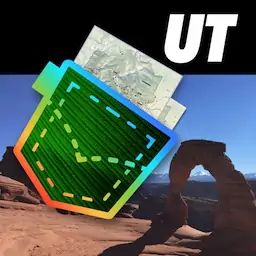"B. Rainbow Bridge With Navajo Mountain" by U.S. National Park Service , public domain
A Century of PreservationRainbow Bridge |
Brochure A Century of Preservation at Rainbow Bridge National Monument (NM) in Utah. Published by the National Park Service (NPS).
featured in
| National Parks Pocket Maps |  | |
| Utah Pocket Maps |  |
Rainbow Bridge
National Park Service
U.S. Department of the Interior
Rainbow Bridge National Monument
Glen Canyon National Recreation Area
A Century of Preservation
Rainbow Bridge National
Monument was established May 30,
1910 by President William Howard
Taft as a scientific example of
“eccentric stream erosion”.
The 1906 Antiquities Act, signed
into law by President Theodore
Roosevelt, provided himself and
future presidents the “power of the
pen”, the authority to set aside sites
of cultural or natural significance as
national monuments.
In 1906, the southwestern United
States was still a frontier and the
existence of Rainbow Bridge was
yet unknown to the outside world.
The Discovery Party
It was in 1909, that Anglos discovered Rainbow
Bridge, the same year that Commodore Perry
reached the North Pole. A dozen men from two
different groups - one faction from University of
Utah led by Professor Byron Cummings and another
with the federal surveyor William Douglass – decided
to join forces. Departing from the Oljato Trading
Post in Utah, they persevered through 4 ½ days in
the vast, carved, canyon wilderness of southern
Utah/northern Arizona. The expedition was guided
A Natural Wonder
by two Paiutes, Jim Mike and Nasja Begay, and also
included John Wetherill, who operated the trading
post at Oljato. It was Wetherill who was first to arrive
under the bridge, on his horse, about noon on August
14, 1909.
But discovery - actually proving the bridge’s existence
- was not the only goal of the 1909 expedition group.
They also wanted to survey the bridge and have it set
aside as a national monument.
One-hundred years later, we reap the rewards of their
efforts. Eight and a half months after the discovery and
survey, President Taft proclaimed Rainbow Bridge
a National Monument. Today’s visitor may boat to
within a mile of the bridge via Lake Powell, a much
easier trip than that of the discovery party. Despite
its increased accessibility, it still sits in one of the most
remote locales in the lower 48 states. The visitor who
takes a moment to soak in their surroundings can still
feel that they have found the middle of nowhere.
A Park Ranger welcomes visitors to the Rainbow Bridge
docks
EXPERIENCE YOUR AMERICA™
Back in Time
Rainbow Bridge Spanning Cultures in a
Sacred Landscape
In 1910, Taft preserved more than the physically
impressive bridge (290 feet tall x 275 feet wide), he
also preserved an earlier human connection to the
bridge that likely dates back thousands of years. The
Douglass/Cummings Party found a 3x5 foot oval
fire pit made of rocks near the base of the bridge.
Recently, charred wood fragments were carbon
dated to about AD 540. Standing before the bridge,
it’s easy to ponder when that first indigenous visitor
arrived at the bridge, and what his/her thoughts
were.
Preservation of an ancient paleo environment was
assured with that stroke of a pen in 1910 as well. One
approaches the bridge on a sandstone surface that was
deposited in the early Jurassic Age, roughly 200 million
years ago when dinosaurs roamed the area. The bridge
itself is sculpted from the hardened sediments of an
enormous, harsh desert that was near sea level and
much closer to the equator - the Sahara Desert of the
Jurassic Age.
Remains of ancient rock hearth found near the base of
Rainbow Bridge
Fossilized footprint of a Dilophosaurus, found at the
viewing area
Rainbow Bridge appears much as it did the moment of its discovery by the earliest human visitor. Today’s
visitor to Rainbow Bridge National Monument benefits from the wisdom, now 100 years in duration, to protect
precious sites such as Rainbow Bridge, for many centuries to come.
Rainbow Bridge from the sky
EXPERIENCE YOUR AMERICA™


